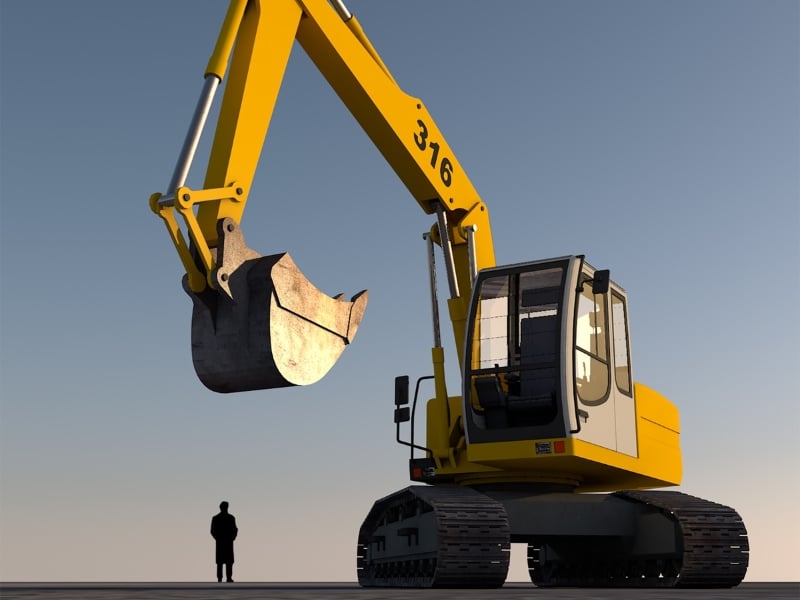Operating an excavator is a skilled job that requires careful attention to safety. Whether you’re a seasoned operator or a newbie, understanding and following safety procedures is crucial to prevent accidents and injuries. This guide will walk you through the essential steps to operate an excavator safely.
What are the basic steps to operate an excavator?
Before you even start the engine, it’s essential to familiarise yourself with the machine’s controls and safety features. Here’s a basic outline:
- Pre-operation safety check: This involves inspecting the excavator for any damage, leaks, or loose parts.
- Start the engine: Follow the manufacturer’s instructions carefully.
- Operate the controls: Practice using the levers and pedals to control the excavator’s movement.
- Digging and loading: Perform these tasks cautiously, maintaining a stable position.
- Transporting materials: Move materials carefully, avoiding obstacles and people.
- Shut down the engine: Follow the correct procedure to ensure safety.
How do you perform a pre-operation safety check?
A thorough pre-operation check is essential for safe excavator operation. Here’s a checklist:
- Inspect the tracks or tyres for damage or wear.
- Check the undercarriage for any obstructions.
- Examine the hydraulic system for leaks.
- Verify the lights, horn, and other warning devices are working.
- Ensure the seatbelt is in good condition.
- Check the emergency stop system.
- Inspect the bucket and its attachments for damage.
How can you safely start and shut down an excavator?
Starting and shutting down an excavator correctly is vital for safety. Follow these steps:
- Starting:
- Ensure the parking brake is engaged.
- Check the surroundings for people or obstacles.
- Follow the manufacturer’s starting procedure.
- Shutting down:
- Lower the bucket to the ground.
- Turn off all attachments.
- Engage the parking brake.
- Allow the engine to cool down before leaving the machine.
What are the essential safety tips when operating an excavator?
Safety should always be your top priority when operating an excavator. Here are some essential tips:
- Always wear appropriate safety gear, including a hard hat, safety glasses, and gloves.
- Maintain a safe distance from the excavator’s edges and blind spots.
- Be aware of your surroundings, including other equipment and personnel.
- Communicate effectively with other workers on the site.
- Never carry passengers in the excavator.
- Avoid overloading the bucket.
- Take regular breaks to prevent fatigue.
How do you navigate and operate an excavator on uneven terrain?
Operating an excavator on uneven terrain requires extra caution. Here are some tips:
- Travel at a slow speed.
- Keep the excavator in a stable position.
- Avoid sudden movements.
- Be aware of potential hazards, such as rocks or holes.
- Use the machine’s counterweights to maintain balance.
What should you do in case of an emergency while operating an excavator?
Unexpected situations can arise during excavator operations, and knowing how to respond promptly and effectively is crucial for preventing injuries and damage.
In case of an emergency, follow these steps:
- Immediately activate the emergency stop button to halt the excavator’s operation.
- Safely exit the excavator, ensuring your safety and that of others nearby.
- Assess the situation calmly and systematically to determine the extent of the emergency and potential hazards.
- Assist those affected, such as calling emergency services if required.
- Report the incident to your supervisor, providing as much detail as possible about the circumstances.
How can you maintain an excavator to ensure long-term safety?
Consistent maintenance is vital for optimal excavator performance and extending its lifespan. Regular inspections help identify and address minor issues before they escalate, preventing costly breakdowns and downtime.
Regular maintenance tasks include:
- Adhering to the manufacturer’s recommended maintenance schedule.
- Regularly checking and maintaining appropriate fluid levels.
- Conducting frequent inspections of the tracks or tyres for signs of wear and tear.
By consistently performing these essential maintenance tasks, you can help ensure your excavator’s long-term safety and reliability.
How do you operate an excavator in different weather conditions?
Weather conditions can affect excavator operation. Here are some tips for different weather types:
- Rain: Reduce speed, increase visibility, and be cautious of slippery ground.
- Wind: Be aware of the excavator’s stability and potential for tipping.
- Snow: Use appropriate tyres or tracks, increase visibility, and take extra precautions.
Why should you take an excavator training course?
A formal training course is wise for operators at every skill level. It’s more than just gaining an excavator licence; it’s about acquiring a comprehensive understanding of excavator operation and safety.
A well-structured training program offers a multitude of benefits:
- In-depth knowledge of excavator operation: Learn the intricacies of excavator mechanics, hydraulics, and controls. Gain a deep understanding of how each component works together to ensure optimal performance and efficiency.
- Hands-on experience with the machine: Practical training is invaluable. Get behind the controls and develop the skills to maneuver the excavator confidently and safely in various conditions.
- Safety guidelines and best practices: Prioritise safety with expert hazard identification, risk assessment, and prevention instruction. Learn essential safety protocols to protect yourself and others on the job site.
- Emergency procedures: Be prepared for unexpected situations. Master emergency shutdown procedures, evacuation techniques, and first aid basics.
- Enhanced job prospects: A formal excavator certification can significantly boost your career. Demonstrate your commitment to safety and expertise to potential employers, increasing your employability.
- Increased efficiency: Learn time-saving techniques and productivity-boosting strategies. Master the art of efficient digging, loading, and material handling.
- Reduced risk of accidents: A well-trained operator is less likely to make costly mistakes. Develop the skills and knowledge to avoid accidents and minimise downtime.
By completing an excavator training course, you’ll gain the confidence and competence to operate the machine safely and effectively. It’s an investment in your career and your safety.
Safezone Training: Your partner in safety
Safezone Training offers comprehensive excavator operator training courses to equip you with the skills and knowledge to operate safely and efficiently. Our expert instructors provide hands-on training and practical guidance to ensure your confidence and competence. Contact Safezone Training today to learn more about our excavator courses and how we can help you achieve your goals.
Remember, safety should always be your top priority when operating heavy machinery. By following these guidelines and seeking proper training, you can contribute to a safer work environment for everyone.



